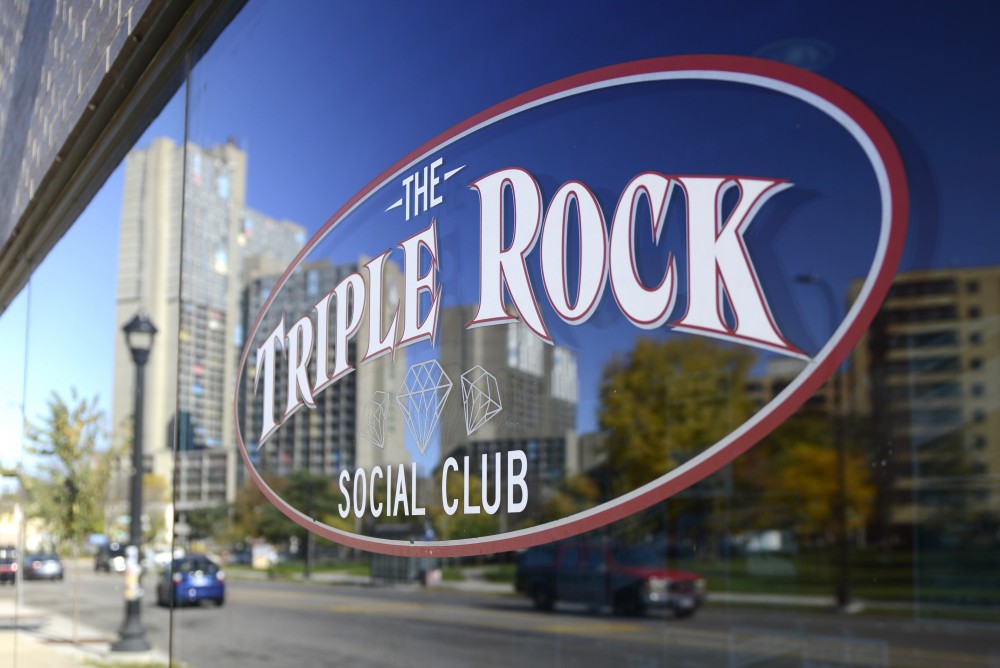For 19 years, the Triple Rock Social Club was West Bank’s punk hub for local music and high-quality vegan brunch. This month, news reverberated across the Minneapolis music scene and social media that the Triple Rock will close Nov. 22.
The Triple Rock’s Facebook post announcing the news received over 4,000 reactions, and fans of the venue are left wondering where to turn next.
“I’m going to miss having a place that felt independent [and] that I could relate to,” said Luke Michaels, a graphic design senior at the University of Minnesota who serves as Radio K’s director. “It’s a place that felt a little more connected to the Minneapolis DIY [music] community and the art community.”
The Triple Rock was the ideal venue for students — affordable tickets and a close walk from West Bank campus made the setting an easy introduction to the local music scene.
“One of my first shows in Minneapolis was at the Triple Rock,” said Sylvia Jennings, a senior studying economics and communication who hosts Radio K’s local music show, “Off the Record.” “One of my friends was going to the show, and we took the Green Line over from Superblock… Triple Rock is easy to get to, and you don’t really have to figure out transportation that much.”
Over the course of its 19-year life, the Triple Rock stayed in the hands of its owners Gretchen and Erik Funk, a rare occurrence for a local venue.
“This one never changed hands in the 19 years that it’s been in existence,” said Natalie Krueger, a Twin Cities musician who performed at the Triple Rock. “That’s insane to have the same place for 19 years and be in charge of it… So you know what? If they’re ready to be done, they’re ready to be done.”
Most regulars have a favorite Triple Rock memory, whether it’s jumping on stage to play with a favorite band or being able to break out a new idea for a song.
“My favorite memory was during our release show with the Florists. We have this long sort of dance-y song, and we collaborated with some University of Minnesota dancers,” Michaels said. “We miked the floor, so the dancers were creating percussion along with the band… The Triple Rock was so down to… do something different… You could experiment with ways that the show looked or sounded to people.”
With such a long-standing reputation in the music community, the Triple Rock fostered a tight-knit, distinctly Midwestern community unseen in other venues. With its commitment to local and national bands, music fans of all genres found a home at the Triple Rock and were supported by the owners and management.
“They know a vast majority of their patrons on a first name basis,” Tommy Rehbein, a Twin Cities musician who also performed at the Triple Rock, said. “I also noticed that the Triple Rock is very good at listening to people if they have a concern, or if they feel that they’re underrepresented in the shows.”
Earlier this summer, for example, the Triple Rock management reached out to Krueger about doing a residency in August, which eventually developed into a series of shows called “The Gay Agenda” that benefited the Minnesota Transgender Health Coalition.
“They were super intimate, really fun shows,” Krueger said. “I just asked bands that had queer people that I really liked in them … It wasn’t just to have shows for the crowds, but it was more to be like ‘hey, here are your buds. Go play with them.’”
Some Triple Rock regulars see the closure as further evidence of a larger trend of gentrification in the Twin Cities — the Reverie, another vegan restaurant that hosted nightly live music, closed in July.
“There’s some gatekeeping in the music scene, and I think that’s a symptom of the serious gentrification that’s been going on in this city,” Krueger said.
“That’s what breaks my heart. I’m seeing the culture get run down by these luxury condos… [and] the clubs that don’t cater to those people are left behind.”
Many patrons are left wondering what’s next for the venue and the Minneapolis music scene in general.
“I don’t know what exactly is going to happen… If someone who reads this has $100,000 that they’d like to donate to me, I will open my own spot. I would make that happen,” Krueger said.
Even if such a venue was to open, it might take years to rebuild the atmosphere that made the Triple Rock home for musicians and listeners alike.
“It’s a place where so many people connected, and when you have a spot… that really centralizes things, that’s where things start to grow,” Krueger said.








